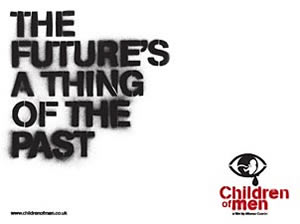Children of Men

Fictional views of the future, and particularly the near future, are usually devised by the writer taking the contemporary socio-political situation and creating a logical path they consider events will follow. This is usually dictated by the author's general disposition. The pessimist creates a dystopian future and the optimist a utopian one. The dystopian vision, while bleak, does better to serve as a warning as to where we could head if we don't stay alert. Orwell's 1984 is a prime example, and although he may have missed the mark by some twenty years, his vision of the future is a much truer reality than most would care to admit. From the fascist government disguising itself as a caring socialist party, to the endless surveillance cameras and erosion of civil liberties, and many other correlations Orwell's future is very much here.
And although the writers of MAX HEADROOM only looked twenty minutes into the future, it was already 1985 when that show first hit the airwaves with its prescient view of a world of haves and have-nots controlled by television and media conglomerates. So the reality of our present world sees the collision of these two future-visions where Big Brother is watching us and we are watching Big Brother. And while we are living in the media-controlled illusion of a great Britain, the reality that this country is fast becoming a third world country devoid of industry and resources is being hidden from us. The Britain created by Alfonso Cuarón for his adaptation of P.D. James' novel CHILDREN OF MEN is also bleak but, under current conditions, one that is entirely feasible.
The film is set in 2027 in a world where humanity's survival seems impossible: women have stopped bearing children. The last child born is a global celebrity, who is assassinated in the film's opening, which really does start with a bang. Britain is one of the few countries that is surviving the global meltdown thanks to its military might and its brutal and totalitarian treatment of refugees by incarcerating them detainment camps for deportation (sound familiar?)
Our hero, Theo (Clive Owen), a former activist turned bureaucrat has steeled himself against his painful past and the reality of a senseless future by simply ceasing to care. Owen is a perfect choice for the lead as he has knack for delivering lines devoid of emotion. His only pleasure is visits to his friend, Jasper (Michael Caine), an old hippy who lives in self-sufficient hideaway miles from London. Caine, looking like an old John Lennon, seems to relish the role and is a great counter-balance to the morose Owen.

The action kicks off when Theo is bundle into the back of a van and taken to meet Julian (Julianne Moore), his ex-partner in both love and war, as they not only shared a bed but a passion for rebellion. Julian is still a revolutionary and wants her ex to help her get transit papers for Kee (Clare-Hope Ashitey), a young woman who she needs to get safely out of the country, because as it transpires she is eight months pregnant.
So begins the race against time and an assortment of organisations with a vested interest in getting their hands on Kee and her baby. Knowing whom to trust becomes harder and harder as they battle their way to a rendezvous with an almost mythical group called the Human Project.
This film is very much Cuarón's, with his vision and direction dominating. His vision of future Britain is really not that far removed from our present reality, complete with fields of cattle being incinerated. The action pieces are brilliantly executed, especially towards the end, with some amazing handheld camerawork that gives it a real sense of a battlefront documentary. There are a lot of long takes, which along with grainy photography, further enhances the documentary feel. A lot of British films have a flat grey look to them, which reflects the general climate, however this film is dark but contrasty, which seems to highlight the bleak mood of the piece.
Apart from Theo and Kee, characters come and go and very little empathy is attached to them, with the exception of Caine's character. Chiwetel Ejiofor plays a character almost as nasty as the one in SERENITY, but not quite as cold, calculating or ruthless, but close.
Clive Owen's emotionless performance aside, this is a powerful and thought-provoking movie that will keep you engrossed. It also has some moments of humour, even if they are of a schadenfreude nature, such as when Theo has to escape shoeless. As is fitting for a film of this type it does not have a happy ending but rather one that is open and undetermined, although resolved and with hope. Definitely worth seeing.
CHILDREN OF MEN opens nationwide September 22.
Official website

0 Comments:
Post a Comment
<< Home